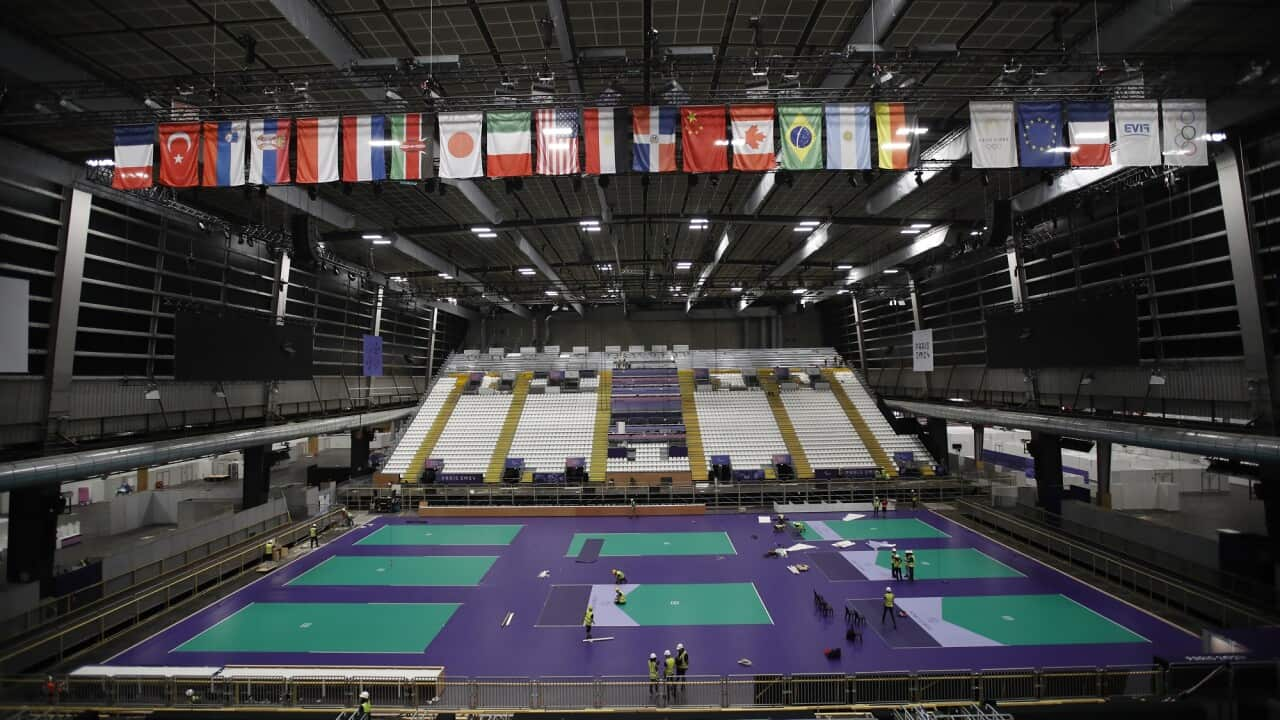(Sound of drills and construction.)
The Eiffel Tower Stadium played host to beach volleyball contests during this year's Paris Olympic Games.
Now it's being converted for the 2024 Paralympics.
Gautier Jourdet is the venue delivery manager.
"Right now, we are in the middle of a transition phase. That is to say that for those who were lucky enough to come and watch beach volleyball during the Olympic Games, before here, we had a large sandbox right in the middle of the field of play that we are currently covering to make way for a blind football field and a grass pitch, that will also be in the middle of the stadium. So that requires a certain amount of work, adaptation work. Already, at the level of the stands, we can see that we had some stands that went down to the level of the playing area for beach volleyball that we had to remove for blind football. We are talking about around 500 places to remove in a few days, which in fact allow us to widen the blind football pitch, which is a little bit bigger than the beach volleyball pitch."
He says the preparations take into account the importance of acoustics for the sport.
"Blind football is a sport in which acoustics are very important because the players are guided a lot by sound, sound coming from bells inside the ball and also by the guides that are outside the field of play. And so for that, it is extremely important that the field itself has good sound absorption capacities."
That means the 400 tonnes of sand installed for the beach volleyball field of play is not being removed.
It's being kept underneath the football field to help the visually impaired athletes.
That's according to Paris 2024 project manager, Remi Garranget.
"If you have a resonant floor, it's noise pollution. It's like you're cutting off the light from sighted athletes from time to time, so you're taking away their senses which are important for playing on a resonant floor."
He says the audience may not realise what a game of football at the Paralympics entails - but believes it will be an incredible competition.
"So blind football is the contraction between blindness and football. So it's football for visually impaired people, it's played five against five. So you have four blind field players and a goalkeeper who is sighted. The players wear masks. There are some who are very, very visually impaired, who have a little light perception, so it allows everyone to be put on an equal footing. And then, you have lots of rules that allow football to be adapted to disability. You have to imagine that you are in complete darkness, we have still some senses left, in particular hearing. You have a sound ball, the rotation of the ball and the beads inside, the little bells, allow the player to spot it, depending on where it makes noise."
The paralympic blind football events are due to begin at the foot of the Eiffel Tower on September 1st, with a final scheduled for September 7th.
It's one of a host of events that nearly 4,500 athletes will participate in [[across 22 Paralympic sports – and with 141 gold medals up for grabs]].
Among them will be eight competitors and one runner guide on the Refugee Paralympic Team, who are looking to send a message of hope in Paris.
They'll be competing in six sports: para-athletics, para-powerlifting, para-table tennis, para-taekwondo, para-triathlon, and wheelchair fencing.
Among them is Ibrahim Al Hussein, a Syrian para-triathlete.
"I don't consider myself a role model. I've come here to prove that anyone is able to achieve their goal. Despite all the challenges I have faced in my life, despite the fact that I left Syria on a wheelchair, despite the fact that I rebuilt my life from below zero - this is a message of hope to the whole world and a message of hope to everyone around the world, to anyone who is miserable, to anyone who does not have the spirit of perseverance."
The Paralympians will be staying in the village occupied by the competitors in the just completed Paris Olympics.
Head of Integration, Ludivine Munos, says major changes are not required, because the accommodation was designed to be accessible to all.
"There are some very concrete examples, such as the balconies. Often, to get onto a balcony, you have to step over the edge of the balcony to get outside. But not at all. Everything is on the same level, so you can have your coffee on the balcony with your wheelchair or with someone who has a prosthetic. They won't have to step over it either, because sometimes, I promise you, it's not easy. And also, all the rooms have an accessible bathroom and a normal one. Which means we don't have to change the configurations of the pairs of athletes when choosing the apartment. All the rooms are accessible."













